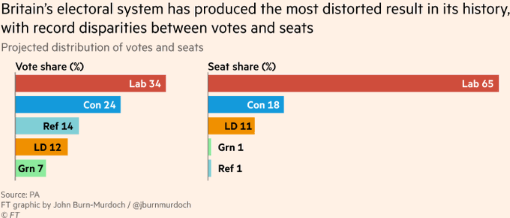What do Canadian advocates of proportional representation think about the July 4, 2024 election in the UK?
Jul 10th, 2024 | By Randall White | Category: In BriefRANDALL WHITE, GLOBAL VILLAGE NOTES, TORONTO . WEDNESDAY, JULY 10, 2024. John Rentoul at The Independent nicely summarized this past Thursday’s general election in the United Kingdom with the headline “The strangest landslide.”
As widely expected (and foretold in polls) Keir Starmer’s Labour Party won a strong majority of seats in the Mother of Parliaments at Westminster. As Rentoul wrote : “Labour’s total, 412 seats, is not only one more than the exit poll but is a fraction of an MP smaller than Tony Blair’s majority in 1997, taking into account the House of Commons is now 650 MPs instead of 659 … It is a huge achievement for Keir Starmer …”
At the same time, Mr. Rentoul noted : “There will be a lot of talk about how ‘unfair’ the result was, with Labour winning two-thirds of seats on one-third of votes, but I agree with Anton Howes, the historian: ‘This is first past the post at its best, allowing the electorate to mete out proper punishment and let another team have a proper go of it without having to bend to fringe parties that hardly anybody at all wants.’”
Whatever you think about Anton Howes’s view on the “first past the post” electoral system in the birthplace of Westminster parliamentary democracy, the general picture of the 2024 UK election based on seats won in the House of Commons is dramatically different from the picture based on shares of the popular vote.
Based on seats, new PM Starmer’s Labour Party has won a landslide — 65% of all seats in the Commons, and an impregnable majority in getting legislation passed (provided of course his 412 Labour MPs remain united on most crucial votes).
Rishi Sunak’s former governing Conservatives (now with only 18% of seats in the Commons) have similarly been unambiguously repudiated. (Or properly punished, as Anton Howes would put it. And for an account of at least many of the ways in which the Conservatives deserve punishment for their time in office since 2010, see Tom Crewe’s “Carnival of Self-Harm” in the 20 June 2024 issue of the London Review of Books.)
Based on popular vote, the Starmer Labour Party took only 34% of the UK-wide numbers — just 10 points ahead of the Sunak Conservatives’ 24%. And Nigel Farage’s Reform UK (to the right of the Conservatives, not unlike Preston Manning’s Reform Party in Canada, before Stephen Harper’s Conservative reorganization) took 14%.
Some voters, that is to say, wanted to punish the Conservatives for being insufficiently right-wing conservative. And the Conservatives and Reform UK together actually won four points more of the popular vote than Labour.
(You might somewhat similarly add the Liberal Democrat and Green shares of the popular vote to Labour’s share, for an overall “progressive” majority. But this is somewhat complicated by the historical circumstance that after the 2010 election which started the most recent Conservative dynasty : “When negotiations to form a Liberal Democratic–Labour coalition failed, the Liberal Democrats joined the Conservatives in a coalition government led by [Conservative leader David] Cameron, who became prime minister.”)
In any case what I finally wonder most about, here in the former first self-governing dominion of the now defunct British empire, is just how the 2024 UK election strikes New Democrats and others in Canada who strongly criticize Justin Trudeau for not delivering “proportional representation” in the Canadian House of Commons (as allegedly and at best far from exactly promised in 2015)?
Proportional representation, practised in various parts of continental Europe and elsewhere, is a mathematical (and political structural) arrangement, that gives a political party more or less the same share of seats in a legislature that it won in the popular vote.
I am not exactly a fan of proportional representation myself. But I agree that it is at least theoretically “more democratic” than first past the post — which works best when there are only two major or serious political parties contesting elections. I have also been a frequent quiet (ie un-noticed) critic of the Doug Ford Conservatives in Ontario, on the grounds that they won their current 67 % of seats in the Legislative Assembly [aka Provincial Parliament] with less than 41% of the province-wide popular vote.
As a question of democratic theory in some pure sense I am not for the moment at all sure just what I think of the 2024 UK election myself — with its dramatic and apparently even historic discrepancy between democratic share of the popular vote and share of seats in the legislature (in a land of government and politics ruled in theory by the doctrine of “parliamentary supremacy”).
As an interested observer of politics in the United Kingdom, however, I am not at all practically disappointed that Keir Starmer’s Labour Party has such an artificial surplus of seats in the Mother of Parliaments.
And I hope John Rentoul is also on the money when he suggests PM Starmer’s new government will last for a while …
… meanwhile, as to whether any of this might have any impact on November 5, 2024 in the USA, I don’t think I’d hazard even the slightest guess right now …






